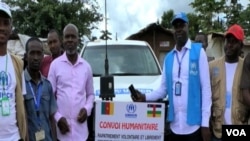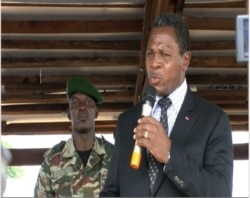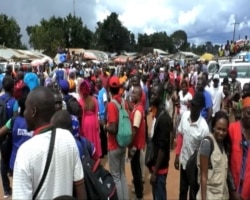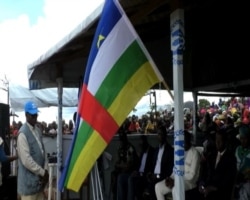Cameroonian and Central African Republic (CAR) officials greeted a group of about 200 CAR refugees Wednesday as they crossed the border and headed home.
Members of the group — among more than 6,000 CAR refugees in Cameroon who agreed to voluntarily repatriate by the end of the year — say they hope for peace following a Khartoum agreement their government signed with rebel groups.
However, there are over 270,000 CAR refugees who are reluctant to leave Cameroon because of sporadic fighting along the border.
"President Paul Biya gave me the power of attorney to sign the tripartite accord that is with the Central African government and with the [U.N.] High Commissioner of the Refugees," Cameroon's Minister of Territorial Administration, Paul Atanga Nji, said of the June 29 repatriation deal. "This was done, so we are now putting it into practice. You know the principle following international standards is that people must go when they want to go. We insist on the word 'voluntary' departure."
Pierre Dumai, 53, is among those returning to the capital, Bangui.
He says he hopes he will find peace in CAR, as well as government assistance to farm. Without assistance, he says, he will not be able to feed and educate his two children.
The Central African Republic has promised to socially and economically integrate refugees who return from Cameroon.
By the end of the week, about 500 CAR refugees who agreed to leave Cameroon will return home.
The U.N. refugee agency's (UNHCR) commissioner to Cameroon, Kouassi Lazare Etien, says those leaving have seen that the security situation in the CAR has improved.
"We conducted a return intention survey whereby refugees themselves declared their willingness to go back home," Etien said. "When the situation back home warrants their return, this type of ceremony takes place."
But while 6,000 CAR refugees are leaving, the UNHCR says 274,000 are reluctant to return and will remain in Cameroon.
Many of the remaining refugees raise concerns about reintegration and ongoing security threats.
CAR refugee Mikawe Welivu, 36, says he is not confident it is safe for him and his four children to go home. For now, he is staying in Cameroon, he says, because he hears stories of looting, destruction, killings, kidnappings for ransom and rebel groups attacking each other.
The President of the Central African Republic, Faustin-Archange Touadera, signed a February peace deal in Khartoum with 14 armed groups. The deal is hoped to usher in a period of stability in the volatile country after five years of conflict.
But several times since the deal was signed, CAR rebels cut off the road to Bangui to protest being left out of the new cabinet. As a result, Cameroonian trucks transporting food and humanitarian assistance to the Central African Republic were temporarily blocked at the border.
Fighting in the CAR broke out in 2013 when mainly Muslim Seleka rebels ousted then-President Francois Bozize. Retaliation from mostly Christian militias led to clashes that killed thousands of people and displaced hundreds of thousands of others.



